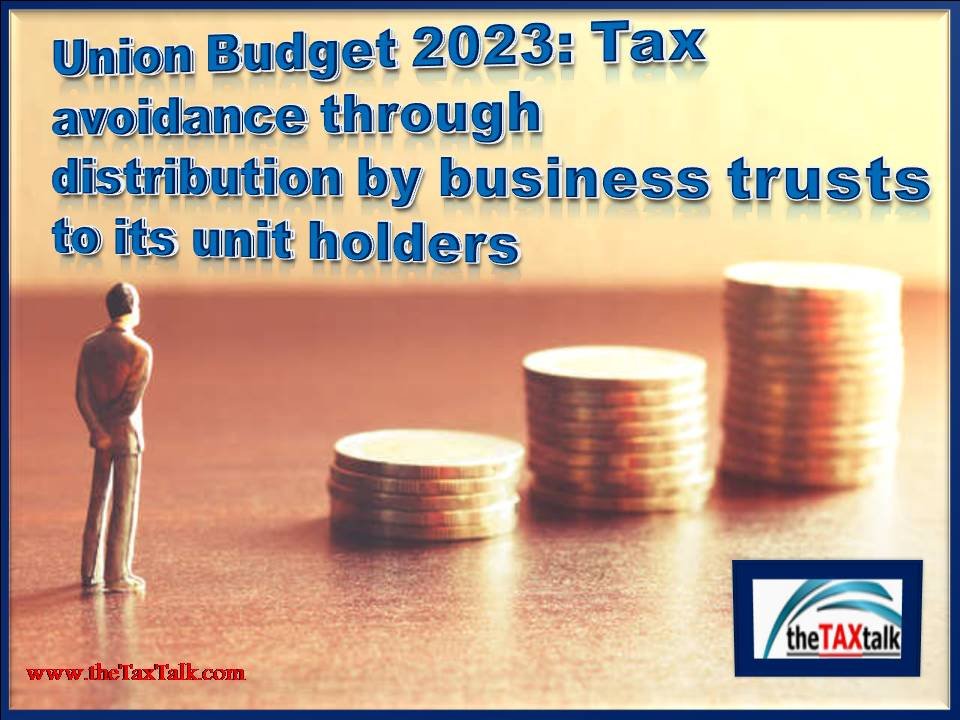![]()
Union Budget 2023: Tax avoidance through distribution by business trusts to its unit holders
- Finance (No.2) Act, 2014 introduced a special taxation regime for Real Estate Investment Trust (REIT) and Infrastructure Investment Trust (InVIT) [commonly referred to as business trusts]. The special regime was introduced in order to address the challenges of financing and investment in infrastructure. The business trusts invest in special purpose vehicles (SPV) through equity or debt instruments.
- Keeping in mind the business structure, the special taxation regime under section 115UA of the Act, inter-alia, provides a pass-through status to business trusts in respect of interest income, dividend income received by the business trust from a special purpose vehicle in case of both REIT and InvIT and rental income in case of REIT. Such income is taxable in the hands of the unit holders unless specifically exempted.
- Sub-section (1) of section 115UA of the Act, inter-alia, provides any income distributed by a business trust to its unit holders shall be deemed to be of the same nature and in the same proportion in the hands of the unit holder as it had been received by the business trust.
- Further, Sub-section (3) of section 115UA of the Act, inter-alia, provides that if the “distributed income” received by a unit holder from the business trust is of the nature as referred to in clause (23FC) or clause (23FCA) of section 10 of the Act i.e., is either rental income of the REIT or interest or dividend received by the business trust from the SPV, then, such distributed income or part thereof shall be deemed to be income of such unit holder.
- It has been noticed in certain cases that business trusts distribute sums to their unit holders which are categorised in the following four categories:
(a) Interest;
(b) Dividend;
(c) Rental income;
(d) Repayment of debt.
- As has been stated above, interest, dividend and rental income have been accorded a pass-through status at the level of business trust and are taxable in the hands of the unit holder. However, in respect of the distributions made by the business trust to its unit holders which are shown as repayment of debt, it is actually an income of unit holder which does not suffer taxation either in the hands of business trust or in the hands of unit holder.
- It may be noted that dual non-taxation of any distribution made by the business trust i.e. which is exempt in the hands of the business trust as well as the unit holder, is not the intent of the special taxation regime applicable to business trusts.
- In view of the above, it is proposed to make such sum received by unit holder taxable in
his hands. However, provision is also proposed for a situation when the sum received by unit holder represents redemption of unit held by him. Hence it is proposed to amend the Act by way of,-
(i) insertion of clause (xii) in sub-section (2) of section 56 of the Act to provide that income chargeable to income-tax under the head “income from other sources” shall also include any sum, received by a unit holder from a business trust, which-
(a) is not in the nature of income as referred to in clause (23FC) or clause (23FCA) of section 10 of the Act; and
(b) is not chargeable to tax under sub-section (2) of section 115UA of the Act;
(ii) insertion of a proviso to the said clause to provide that where the sum received by a unit holder from a business trust is for redemption of unit or units held by him, the sum received shall be reduced by the cost of acquisition of the unit or units to the extent such cost does not exceed the sum received;
(iii)insertion of sub-section (3A) in section 115UA of the Act to provide that the provisions of sub – sections (1), (2) and (3) of this section, shall not apply in respect of any sum, as referred to in clause (xii) of sub-section (2) of section 56 of the Act, received by a unit holder from a business trust;
(iv) insertion of sub-clause (xviic) in clause (24) of section 2 of the Act to provide that income shall include any sum referred to in clause (xii) of sub-section (2) of section 56 of the Act.
- These amendments will take effect from 1st April, 2024 and will accordingly apply to assessment year 2024-25 and subsequent assessment years.


